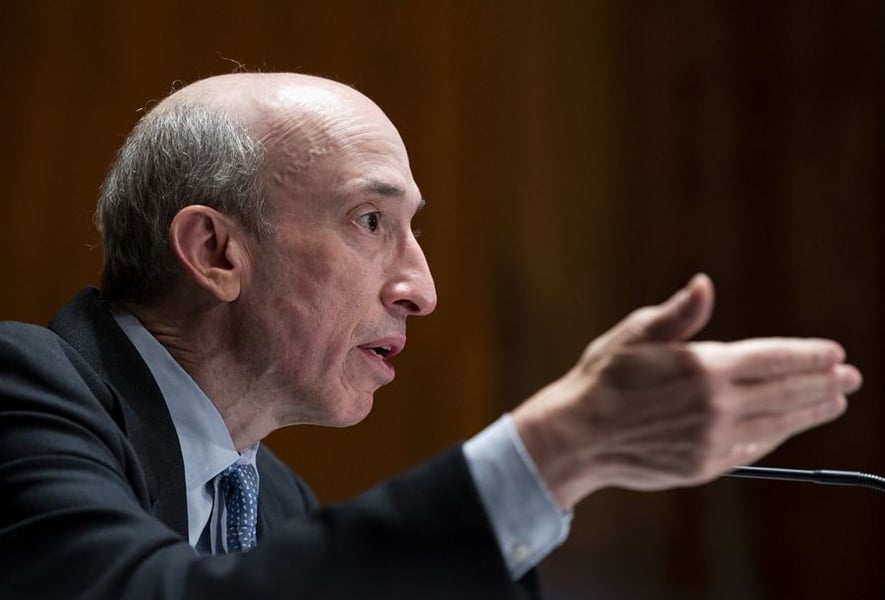

The SEC stepped up the number of enforcement actions it took in the most recent fiscal year, while the total amount of money ordered from securities laws violators dipped, according to statistics the agency’s leader released Wednesday.
The Securities and Exchange Commission filed more than 780 actions in fiscal 2023, SEC Chair Gary Gensler said in a speech at the Securities Enforcement Forum in Washington. He said that number included 500 stand-alone cases.
The agency obtained judgments and orders totaling $5 billion and returned $930 million to harmed investors, Gensler said.
The total number of SEC enforcement actions in fiscal 2023 was 20 more than it filed in fiscal 2022. But the total amount of money the agency collected from offenders fell — from $6.4 billion in fiscal 2022 to the $5 billion recorded in fiscal 23. Money ordered as a result of enforcement actions includes civil penalties, disgorgement and interest.
The $5 billion mark the SEC hit in money ordered from enforcement actions was substantially higher than the $3.9 billion obtained in fiscal 2021. The government fiscal year ended Sept. 30.
The SEC set a record for civil penalties — $4.2 billion — in fiscal 2022. It wasn't clear from the statistics Gensler revealed what the total amount of penalties was for fiscal 2023. The agency likely will release more detailed data later.
“I think deterrence is about more than penalties and monetary relief,” Gensler told reporters on the sidelines of the conference. “It actually starts with a full telling of the facts. I think it’s about holding individuals accountable as well as firms. I think it’s about undertakings, what compliance people are committed to. I do think penalties and monetary relief … [are] an important part of deterrence as well, particularly if it’s disgorgement in getting ill-gotten gains back to some investors.”
In his remarks at the conference, Gensler highlighted high-profile cases, including those that have been brought against financial firms for failing to keep records of so-called off-channel communications that occur when firm personnel use their personal phones and messaging apps to conduct business.
Since the SEC began a sweep related to the issue in December 2021, it has filed cases against 40 firms and ordered $1.5 billion in penalties. In the last fiscal year, the agency settled charges related to record keeping with 23 firms, Gensler said.
“Our actions uncovered not only the widespread use of personal devices and nonofficial channels to discuss business, but a complete failure of financial firms to maintain or preserve those off-channel communications,” Gensler said.
He also pushed back against critics who accuse the SEC of so-called regulation by enforcement, or taking enforcement action to achieve a regulatory goal rather than going through the rulemaking process.
“Some may call high-impact cases regulation by enforcement,” Gensler said. “I call it enforcing the laws and the regulations that are on the books.”
Gensler praised the SEC staff for the enforcement results.
“Every day, they work to advance our mission and ensure the markets work on behalf of investors and issuers, not the other way around,” he said.

Summit Financial unveiled a suite of eight new tools, including AI lead gen and digital marketing software, while MassMutual forges a new partnership with Orion.

A new analysis shows the number of actions plummeting over a six-month period, potentially due to changing priorities and staffing reductions at the agency.

The strategic merger of equals with the $27 billion RIA firm in Los Angeles marks what could be the largest unification of the summer 2025 M&A season.

Report highlights lack of options for those faced with emergency expenses.

However, Raymond James has had success recruiting Commonwealth advisors.
Orion's Tom Wilson on delivering coordinated, high-touch service in a world where returns alone no longer set you apart.
Barely a decade old, registered index-linked annuities have quickly surged in popularity, thanks to their unique blend of protection and growth potential—an appealing option for investors looking to chart a steadier course through today's choppy market waters, says Myles Lambert, Brighthouse Financial.
